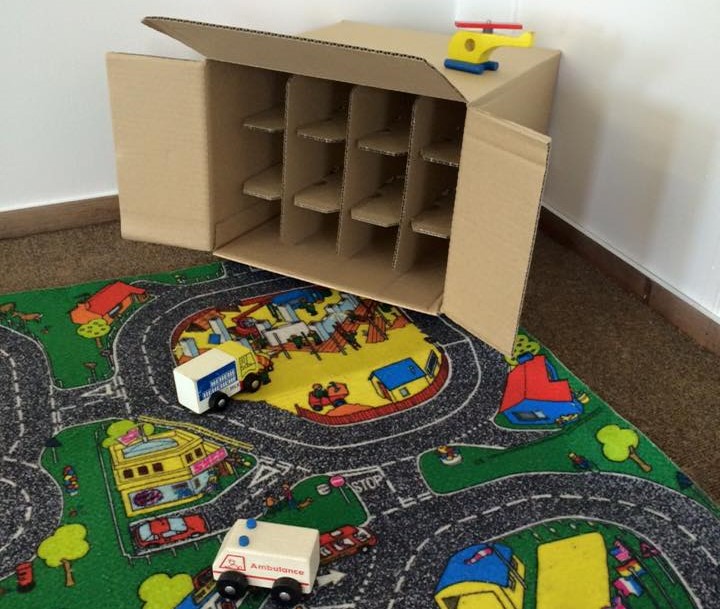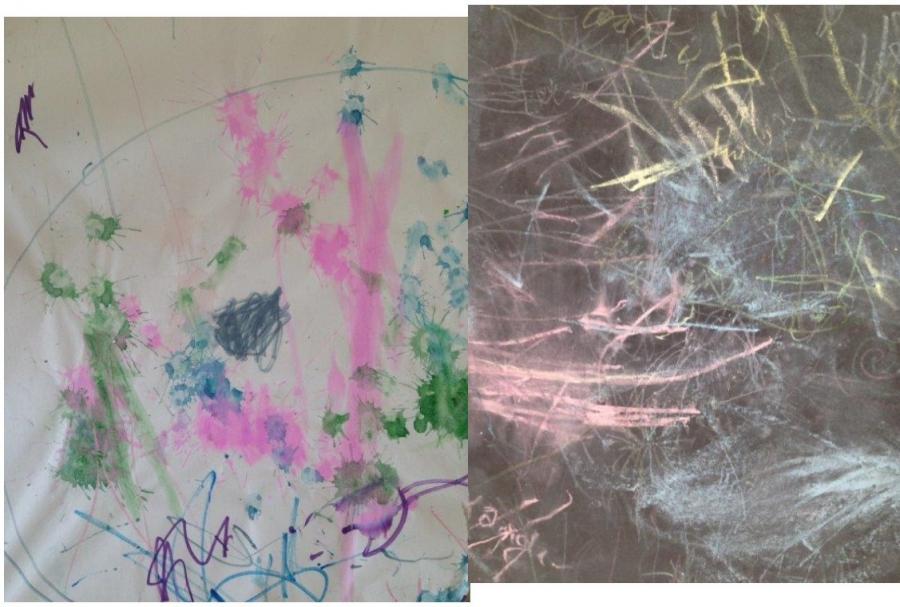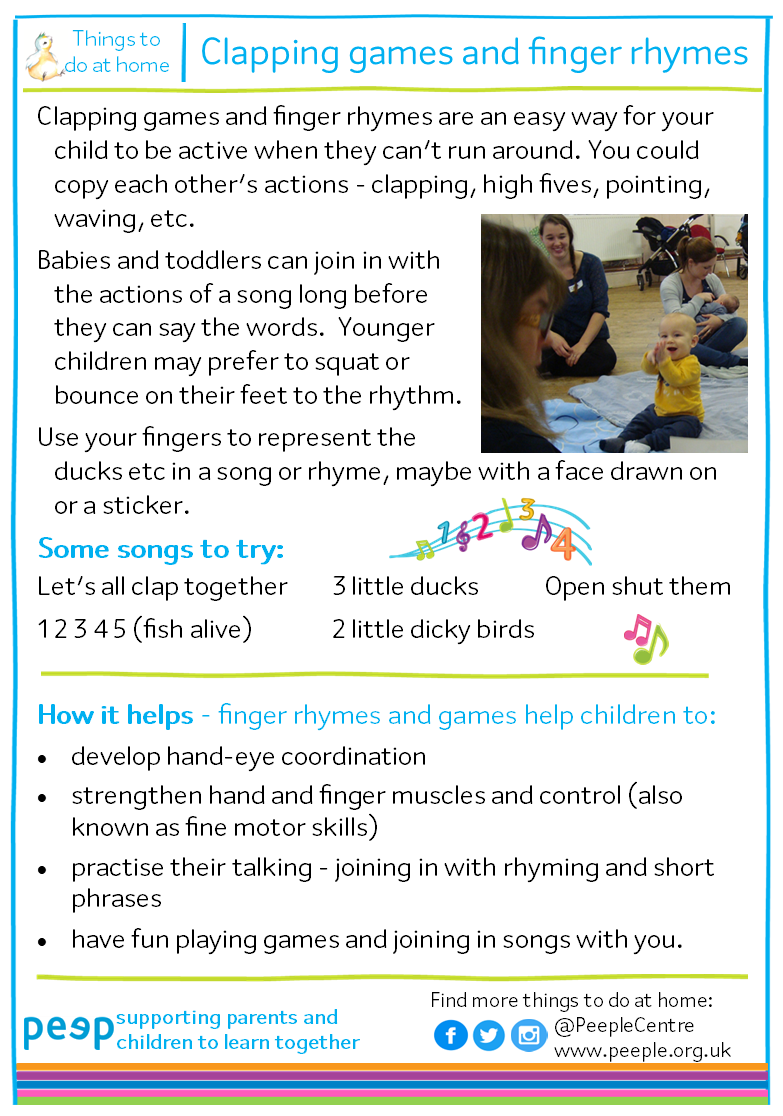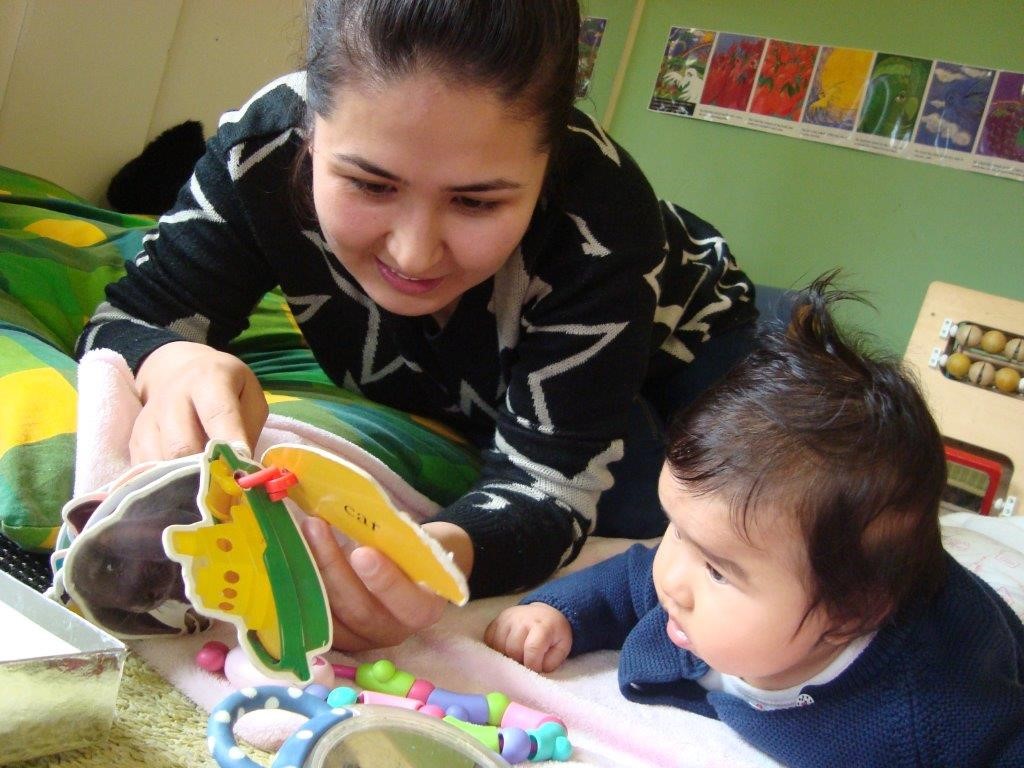Blue
archive EM (scotland)
learning strand unit - early maths
Please select the link according to where you will be delivering this learning strand unit:
Rest of the UK
Feature box colour:
Side Quote Color:
archive EL (scotland)
learning strand unit - early literacy
Please select the link according to where you will be delivering this learning strand unit:
Rest of the UK
Feature box colour:
Side Quote Color:
archive CL (scotland)
learning strand unit - communication & language
Please select the link according to where you will be delivering this learning strand unit:
Rest of the UK
Feature box colour:
Side Quote Color:
archive - PSED (SQA)
learning strand unit - personal, social and emotional development
Please select the link according to where you will be delivering this learning strand unit:
Rest of the UK
Feature box colour:
Side Quote Color:
things to try at home
Here are a few ideas or activities to try at home or in your Peep group. They're all about having fun together, while supporting your baby or child's learning. They're mainly things that lots of people have looked at on our facebook page (https://www.facebook.com/peeplecentre/ - do join us there if you haven't already!) - so we thought we'd make it a bit easier to find them on here too!
If you're a parent or carer and would like to find out about Peep groups in your area then do contact your local children's centre or council. If you're a practitioner and you attend our Learning Together Programme training, then you'll gain access to our log-in members area with lots more ideas and info to share.
Feature box colour:
Side Quote Color:
Peeple Centre-led Peep in Oxford
There are Peep-trained practitioners in many parts of Oxfordshire, working in education, health and social care, family support and the voluntary sector. South Oxford is the only part of the country where Peeple as an organisation employs our own practitioners, based at our Peeple Centre and our Little Peeple Nursery.
Here's a snapshot of Peep group delivery over a range of sessions, from our Peeple Centre practitioners:
Playing 'What's in the bag?', exploring schemas (play patterns) and Peep parent qualification unit
 It was lovely to see how excited our Little Peep group was, to get back to finding out 'What’s in the bag?'! The red bus and the rowing boat still seem to be their favourite finds, and we sang a rousing version of ‘Wheels on the bus’.
It was lovely to see how excited our Little Peep group was, to get back to finding out 'What’s in the bag?'! The red bus and the rowing boat still seem to be their favourite finds, and we sang a rousing version of ‘Wheels on the bus’.
In this group we’ve been talking about schemas - play patterns that children like to repeat again and again. We set up a variety of play stations – rolling balls (Rotation); tucking up dolls (Enveloping); cars (Positioning); building bricks (Connection); pegs and pine cones with little bags to put them in (Transporting) - and enjoyed watching to see what the children were drawn to. And Bartholomew Bear’s antics in John Prater’s Again! is a story we can all relate to, and fits really well when thinking about schemas…
Other groups have been getting started on the Peep Progression Pathway in Supporting Early Learning at Home. The chance to make a keepsake book which records a child’s learning and development is a really special reminder of those precious early years.
Early mark making
 We enjoyed a great session making marks: we taped black and white paper to the floor and let the children explore coloured chalks on black paper and paint dobbers on white paper. The results were wonderfully expressive, lively and colourful. We were surprised how long they spent swirling, scribbling, writing and drawing. Some of our younger children spent a long time making dots and curves, while one or two of our three year olds made a mixture of straight lines and curves which begin to mimic first letters.
We enjoyed a great session making marks: we taped black and white paper to the floor and let the children explore coloured chalks on black paper and paint dobbers on white paper. The results were wonderfully expressive, lively and colourful. We were surprised how long they spent swirling, scribbling, writing and drawing. Some of our younger children spent a long time making dots and curves, while one or two of our three year olds made a mixture of straight lines and curves which begin to mimic first letters.
By coincidence this week we were asking parents and carers for feedback on our sessions. The power of modelling was clear to see, as the little people were very happy to be copying their important adults, who were also busy writing away on the feedback forms.
As usual our songs included actions with a mixture of gross and fine motor skills (large and small movements). These are really helpful for developing muscles in the shoulders, arms, wrists, hands and fingers which are needed for mark making and later writing. We sang Ready and up and down… while we were sitting around the paper, and used the chalks and inks to mimic the words as we did the actions: up and down, side to side, around and around, backwards and forwards.
 Counting, shapes, patterns, routines and everyday maths language
Counting, shapes, patterns, routines and everyday maths language
We’ve been counting in our Peep groups: fingers, toes, shoes – you name it, we’ve counted it! Our 3 little ducks have been busy, and we’ve also been thinking about shapes, patterns, sequences, distance and space. There are lots of lovely stories with numbers, but we’ve also been thinking about ‘all gone’ and singing Peepo!
From their earliest days, babies seem fascinated by black and white high-contrast patterns. We talked about how routines of the day such as meal times, nappy changes and bedtime can introduce and extend the idea of patterns and sequence.
All the maths activities are great for supporting language development too:
This teddy is small but that one’s enormous!
Parents liked the Peep activity sheets which have great ideas to take home (Clapping Games and finger rhymes and Building a chimney pot/ tower together).
Treasure hunt and ORIM
 It’s a great time of year for picking up apples and spotting squirrels. We have been taking advantage of the late summer sun to be outside on a treasure hunt looking for squirrels, hedgehogs, autumn leaves and conkers. ‘Pick up a conker and put it in the basket’ is a great song to make tidying up fun – you can substitute conkers for anything else!
It’s a great time of year for picking up apples and spotting squirrels. We have been taking advantage of the late summer sun to be outside on a treasure hunt looking for squirrels, hedgehogs, autumn leaves and conkers. ‘Pick up a conker and put it in the basket’ is a great song to make tidying up fun – you can substitute conkers for anything else!
Apples have been a big inspiration. As well as encouraging us all to eat more fruit they have inspired one Stay and Play group who painted giant apple cores.
As usual all our Peep sessions have used the ORIM framework:
- Talking about what Opportunities the children have had over the summer break as well as what might be in store for the new term.
- Practitioners and parents/carers have been working hard Recognising what sort of activities would suit their children and groups while we plan for the weeks ahead, as well as offering lots of encouragement to our enthusiastic young learners.
- Interaction: it’s useful to think about the ways we can encourage our babies and children – songs, stories and sharing books feature in all our Peep sessions. What better way to Model to our little ones – doing things together is a great way to show them new things, help them reach their next steps, and build on their instinct to copy what’s going on around them.
Preparing and eating food together (mixed age group) and balance and co-ordination (babies)
In our mixed age Peep group we’ve had a healthy start to the year, exploring fruit and vegetables and talking about where they come from. We also chatted about how buying, preparing, cooking and eating food together supports children’s learning and development. While whizzing up bananas and milk to make delicious milkshakes we were able to talk about cleaning our teeth and handwashing; ‘Here we go round the Mulberry Bush’ is great for modelling the actions.
There are lots of songs to support this topic: ‘Pick up a fruit and put it in the basket’ and ‘Bouncing up and down on my little green tractor’ can both be sung to the tune of ‘Bobby Shaftoe’.
Our handwashing song is sung to the tune of ‘Frere Jacques’/’I hear thunder’, and parents were impressed (and sometimes surprised) at their children’s enthusiasm for washing while they sang…
Soap and water, soap and water
Wash your hands, wash your hands
Rub them both together, rub them both together
Wash them well, wash them well
In Baby Peep we’ve been thinking about balance and co-ordination. The babies have been bouncing, stretching, clapping and grasping and we’ve had fun playing with beanbags and balls. We have been singing ‘Row, row, row your boat’, ‘Heads, shoulders, knees and toes’ and the old favourite ‘This is the way the ladies ride’. It’s such fun (and not just for the babies!) when they get to know a song, and you can see them waiting for you to touch their toes (or trying to touch their own), or getting excited before they go down in the ditch!
A simple but fun activity to try at home that helps develop co-ordination is playing roll the ball.
Visiting the library and sharing books with babies
 Our baby groups visited their local library this month. Not only can babies and children borrow up to 20 books, there are regular events for little ones to enjoy. It’s a great outing, there's an enormous range of books out there to be enjoyed, and it’s free!
Our baby groups visited their local library this month. Not only can babies and children borrow up to 20 books, there are regular events for little ones to enjoy. It’s a great outing, there's an enormous range of books out there to be enjoyed, and it’s free!
Books are great for encouraging lots of things:
- babies reaching out for books helps their gross motor skills
- turning pages supports the development of fine motor skills
- sharing books with babies helps nurture early language
- from the earliest moments, black and white books will capture the interest of a newborn
- focusing on the pictures helps concentration too.
Parents in the groups talked about when and where is a good time for book sharing: books for quiet times, books in the bath, books before bed. Listening to stories is a great way for young children to hear all the sounds that make up spoken language. Stories introduce young babies and children to these sounds, as well as to the rhythms and patterns of language. There’s nothing better than settling down for a cuddle and a good book!
Exploring ORIM, routines and autumn sensory play
This term we have been enjoying using the updated Peep Learning Together Programme. It’s made it really easy to follow any themes and topics that parents have raised in my baby group. In the first weeks I introduced parents to ORIM, and in subsequent weeks we’ve talked about baby watching and Routines: using the Peep group to discuss why the routine helps babies to know what to expect, and to feel secure. Parents spent a lot of time thinking about the question ‘How did you feel before you came to your first Peep group?’. They could then relate that to how their babies might feel about new experiences.
In other Peep groups Autumn has been a big inspiration. ‘Pick up a Conker and Put it in the Basket’ (sung to any well-known tune that fits, such as Bonnie Bobby Shaftoe) reminds us all of the benefits of getting out and about. Children have had opportunities to explore gourds – delighting in their interesting colours and shapes and feeling their knobbly skins. Autumn sensory play with felt leaves, real leaves, pine cones and pasta not only looked (and felt!) a treat, but kept children interested, and supported our autumn songs.
Early mark making: Our mixed age Peep Group loved using fabric paint... Parents enjoyed getting involved too. This session was supported by singing ‘Ready and… up and down’ which introduces young children to the hand and arm motions needed for making letters.
Feature box colour:
Side Quote Color:
frequently asked questions
Please contact us with any questions, and we'll share general info here.
Email: web@peeple.org.uk
FAQs
Feature box colour:
Side Quote Color:
programme and website contributors
peep learning together programme
The Peep Learning Together Programme is the result of 20 years of research, practice and reflection. It has been created from the original programme written by Rosemary Roberts, Alison Street and others. The Programme is underpinned by the ORIM framework which was developed by Peter Hannon and Cathy Nutbrown at the University of Sheffield. Other contributors include (in alphabetical order):
Peeple:
- Katy Baker; practitioner and trainer, and lead author of the programme
- Carly Glover; accreditation coordinator
- Charlotte Holmes; communications manager
- Marie Mackenzie; training manager
- Louise Radford; practitioner and trainer
- Debbie Rudman; practitioner and trainer
- Sally Smith; chief executive officer
Consultants:
- Kathy Brodie; early years consultant
- Julie Cigman; early years consultant
- Franks and Franks; designers
- Debi Maskell-Graham; training consultant
Thank you also to other Peeple staff, trustees and members of our network of trainers, practitioners and managers (past and current) who have all contributed in different, but highly valuable, ways to the development of the programme, accreditation and training. These include: Nuzhat Abbas, Jo Aitkenhead, Jacqui Bain, Allison Collier, Sharon Clarke, Lisa Clissett, Sharyn Crombie, Moyna de Sélincourt, Amanda Godsell, Carol Gotheridge, Helen Griffiths, Jo Hammick, Lindsey Hart, Elina Helinius, Lisse Honeyman, Emma Hrubiak, Emma Jamieson, Alison Laing, Zoe Maré, Jill Mennie, Sue Prosser, Collette Pye, Soozin Rogers, Julia Shay, Ronnie Sinclair, Janet Sly, Paula Stallard, Christine Steer, Helen Stroudley, Catherine Thomas, Alison Wales
We are particularly grateful to all the parents, carers and children who we have worked with over the last 20 years – and from whom we have learnt so much.
website
Our website shares ideas and information that all of the above folk have contributed to, which have been written and shaped in a (hopefully!) helpful way by us here at Peeple.
As well as the above we'd like to thank:
- our website designer Franks and Franks, verbal identity/writing consultant John Simmons and website developer Olamalu
- photographer David Fisher and all the Peep families who gave up their time and allowed us to use their photos, either attending a photoshoot at David's studio and/or being photographed by him at our pre-school, along with the Sutton Trust photographer and Peep families who were photographed at a Peep group. (Occasionally other photos have been used, which have been credited to Getty Images, Bigstock or Cartoonstock as applicable.)
Feature box colour:
Side Quote Color:
tracer study
This small scale Tracer Study was to find out if mothers felt that attending Peep sessions as a baby had made a difference to children and their families as they entered secondary school. Five mothers (selected at random from families that had attended at least ten sessions of Baby Peep in 2001, and who had the same contact details) were interviewed at home in 2013, using a semi-structured questionnaire. The interviews were recorded and transcribed by the researcher and coded for themes.
The interviewer asked about the mothers' experience of Peep and the effects they thought it had had on their own and their child’s development, learning and socialisation. Seven main themes emerged about how Peep had made a difference:
- parents' understanding about the importance of singing and rhyme for language and maths development
“The singing was the main thing I remember, ....songs with the alphabet and numbers, and I remember that distinctly, ‘cos the kids used to really enjoy it” - parents' understanding about the importance of books - and passing this enjoyment on to their child
“It’s made a lot of difference… they just read books nearly all the time, and I’m sure that’s because they started off when they were babies, getting an interest in books” - parents' understanding about the importance of relationships: learning and doing things together with your child can be fun
“I learned to sort of look at them in a different way at Peep, you know I tried to sort of enjoy them, and watch them play.…and it also helped me to relax a bit more with my children. I was quite stressed, and quite highly strung…” - socialisation – children interacting and making friends
“I liked teaching her to make friends with other children although she was so young. It was making her sociable from an early age” - parents supporting each other - both in terms of sharing parenting ideas and experiences (and realising that other parents were 'in the same boat'), and in 'getting out' and enjoying some adult company
“It was just nice to give me a break for an hour as well, and to help me to feel less sort of cut off and isolated …..I met other parents and you could sort of share each others’ sort of parenting skills and stuff. That was quite helpful.” - children settling well into nursery or school, as they were confident and familiar with doing activities with groups of children and adults
"She was quite quickly settled in to nursery because I think she’d already had the practice…with Peep" - on-going confidence and involvement with both their own learning and their children's - a couple of parents had gone on to do early years training and work, and all felt more confident
“I think ‘cos you’ve…been able to take her to a Peep session and been able to talk to other mums and the people who are running it, it gives you more confidence when they go into school, ...so... you will go and ask a question... whereas with the others I didn’t, so when you would go to like parents’ evening you’d just sit there and not say nothing but with her…I always ask questions…”
This study indicates that attending Peep sessions as a baby and toddler directly encourages and enables children’s early learning, facilitates their socialisation and develops parents’ active interest in their child’s learning; together these three elements make up 'school readiness'. Other comments made by the parents also suggest that:
- belonging to a Peep group, with a defined membership and programme, provided support and encouraged attendance
- a community intervention that employed the same people in the same area over several years was at an advantage in recruiting and engaging reluctant parents.
You can download the Tracer Study here.
Feature box colour:
Side Quote Color:
Privacy policy and Cookie Statement
We are committed to protecting your privacy and security.
This page explains our privacy policy and contains separate advice on each of our different charitable activities (how and why we use your personal data) and the use of cookies to help you remain informed and in control of your information.
